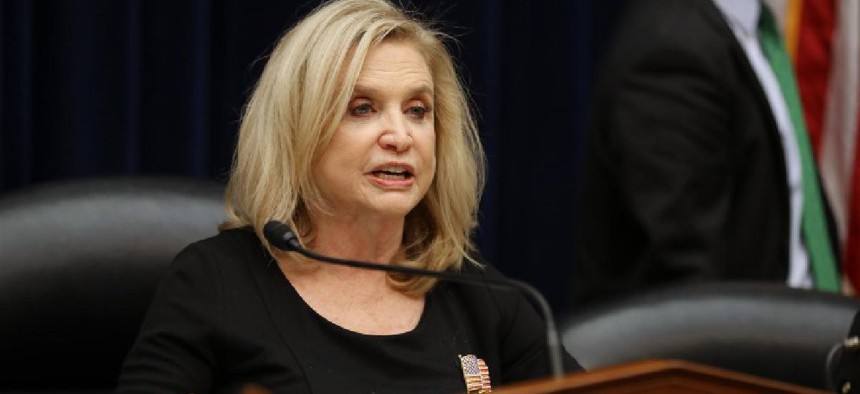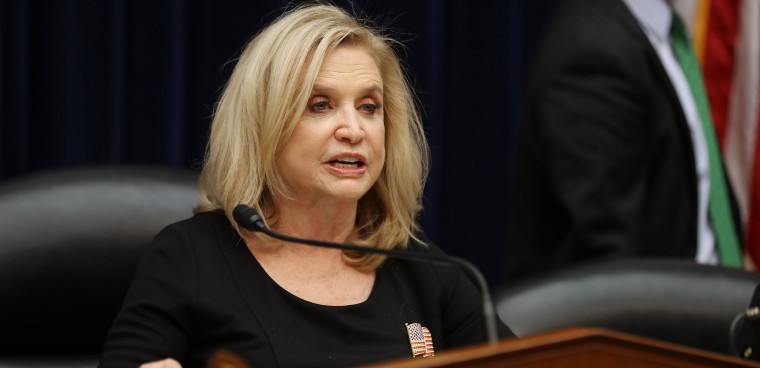Lawmakers spar over paid family and medical leave for feds

Democrats on the House Oversight and Reform Committee want the federal government to be a leader in providing paid family and medical leave to employees.

Rep. Carolyn Maloney (D-N.Y.) chairs a hearing of the House Committee on Oversight and Reform
Democrats and Republicans sparred over a bill that would provide feds with paid family and medical leave during a Thursday hearing held by the House Committee on Oversight and Reform.
The bill, championed by committee chairwoman Carolyn Maloney (D-N.Y.), would give feds 12 weeks of paid leave for needs related to medical issues, family caregiving and military deployments. Sen. Brian Schatz (D-Hawaii) introduced a companion bill in April.
The effort is part of Democrats' broader push for nationwide paid family and medical leave, a goal included in Biden's proposed American Families Plan.
"The Comprehensive Paid Leave for Federal Employees Act is one piece of the vision the administration has laid out," Maloney said during the hearing. "It will strengthen the federal workforce over the long term, and it is a roadmap of the federal government to lead by example in creating a fair and safe work place for American families."
During the hearing, Republican committee members expressed skepticism with expanding the federal benefits package. They also pointed to the lack of a cost estimate for the bill from the Congressional Budget Office.
"We've already dramatically expanded paid leave for the federal workforce," said ranking member of the committee, James Comer (R-Ky.). "We need to put the American people first, not the special interests of federal bureaucrats."
Other Democrats and witnesses at the hearing said that paid family and medical leave would help the agencies with recruitment and retention and pointed to the positive impact the change could have on individual feds.
Although some paid leave benefits were included for federal employees in COVID-19 relief packages, Maloney's bill would be the biggest expansion of federal employee benefits since feds received 12 weeks of paid parental leave in the 2020 National Defense Authorization Act.
"I have heard countless stories from [American Federation of Government Employees] members who have had to make the impossible choice between a paycheck or taking care of a loved one or themselves before they are ready to return to work," said national AFGE president Everett Kelley. "Paid family leave will undoubtedly improve recruitment and retention of talented workers who might leave for other jobs that provide such leave."
Democrats also pushed back against reticence on the part of Republicans to expand the federal employee benefits package, saying that the provision of paid family and medical leave is an overdue necessity.
Having a child "is not a 'perk,'" Maloney said. "If your child is sick, what's wrong with giving them paid leave to be there to be with them?"
Federal pay
In other pay and benefits news, the House Appropriations Committee approved the fiscal year 2022 funding bill for financial services and general government funding.
The bill is silent on federal pay raises. This suggests that the committee is backing President Joe Biden's proposed 2.7% raise for feds. It is unclear how that will affect locality pay and base pay for feds specifically.
It is lower than the 3.2% raise proposed repeatedly by Rep. Gerry Connolly (D-Va.) and Schatz.
In a statement about the bill, national president of the National Treasury Employees Union, Tony Reardon, said that the proposal for a 2.7% raise is a "welcome start to debate over what federal employees deserve next year," but "there is plenty of time for the administration and Congress to reconsider."
The House Appropriations bill also outlines $300 million for the electric vehicle fund backed by Biden to move the federal vehicle fleet to electric and zero emission vehicles.
It also provides a $42 million increase for the Office of Personnel Management over FY 2021 enacted levels. That will help OPM "manage and provide guidance on Federal human resources and administer Federal retirement and health benefit programs," according to the committee's bill summary.
NEXT STORY: Biden nominates MSPB vice chair



